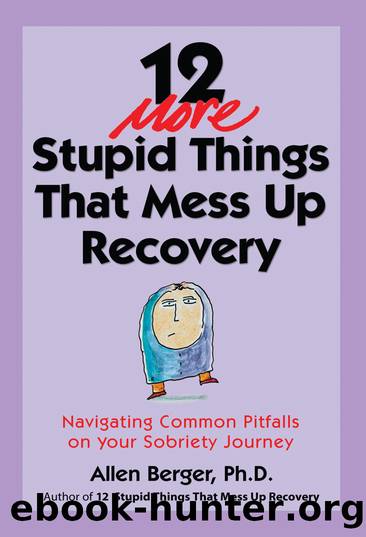12 More Stupid Things That Mess Up Recovery by Allen Berger

Author:Allen Berger
Language: eng
Format: epub
ISBN: 9781616496555
Publisher: Hazelden Publishing
Published: 2016-04-29T00:00:00+00:00
Stupid Thing 7
Using Prescribed Mind-Altering Drugs When Other Remedies Are Available
Mind-altering drugs such as medical marijuana or opioids may be needed for certain conditions, but recovery requires that we use other remedies when we can. These drugs can endanger our sobriety, so we should be sure to find medical doctors who understand our disease, prescribe them only when no other treatments work, and monitor us closely.
There is an alarming trend in the recovery community: a growing number of us are relapsing after receiving medical treatment involving medications prescribed to manage pain from an injury or post-operative pain, or to treat anxiety or a sleep disorder.
It would be easy for us to blame these relapses on the doctors who prescribed these drugs. But this turns us into victims. We may be naïve or too trusting when it comes to making decisions about prescription drugs, but we aren’t victims. Relapse cannot be solely blamed on the prescribers.
Of course, when there is abuse of these medications, the prescribers are culpable, too. Medical doctors have a professional responsibility to first, do no harm. Therefore they must go to reasonable lengths to determine if a patient in recovery from alcoholism or other drug addictions is at risk of misuse that leads to relapse when prescribed certain medications. If medical professionals don’t take this step, then they clearly have a role in creating this problem. It is my hope that medical doctors will take more responsibility in their prescribing practices with members of the recovery community and get better education in these matters.
But we can’t wait until medical doctors become more informed about treating people in recovery. To protect ourselves and our sobriety, we need to become more informed consumers and learn as much as we can about the mind-altering and addictive properties of the medications being prescribed for us.
It is our responsibility to protect our health and sobriety at all costs and that includes not deferring to medical doctors regarding the drugs we take. Doctors are human and make mistakes, too. So we recovering people need to know which classes of drugs are addictive and heighten our risk for relapse. We also need to be sure that our health care providers are reminded that we are in recovery and need to avoid these drugs unless they are absolutely essential. And we need to take steps to use these drugs safely when there is no alternative. (Please note that not all prescription drugs are addictive, and most are safe to use. For example, antidepressants and some antipsychotics “alter” one’s mood or thoughts as they mitigate the symptoms of debilitating depression or mental illness, but they are not addictive.)
Download
This site does not store any files on its server. We only index and link to content provided by other sites. Please contact the content providers to delete copyright contents if any and email us, we'll remove relevant links or contents immediately.
| Adult Children of Alcoholics | Alcoholism |
| Drug Dependency | Gambling |
| Hoarding | Obsessive Compulsive Disorder (OCD) |
| Sexual | Smoking |
| Substance Abuse | Twelve-Step Programs |
The Hacking of the American Mind by Robert H. Lustig(3572)
Right Here, Right Now by Georgia Beers(3493)
Fingerprints of the Gods by Graham Hancock(3204)
Goodbye Paradise(2946)
Bad Pharma by Ben Goldacre(2720)
Happiness by Matthieu Ricard(2515)
More Language of Letting Go: 366 New Daily Meditations by Melody Beattie(2434)
The Social Psychology of Inequality by Unknown(2301)
Drugs Unlimited by Mike Power(2182)
The Plant Paradox by Dr. Steven R. Gundry M.D(2032)
Confessions of a Shopaholic by Sophie Kinsella(1859)
Borders by unknow(1777)
Make Love Not Porn by Cindy Gallop(1746)
Dry by Augusten Burroughs(1683)
Stop Being Mean to Yourself: A Story About Finding the True Meaning of Self-Love by Melody Beattie(1652)
Getting Off by Erica Garza(1609)
Yoga and the Twelve-Step Path by Kyczy Hawk(1529)
Weed, Inc. by Ben Cort(1507)
Unmasking Male Depression by Archibald D. Hart(1502)
